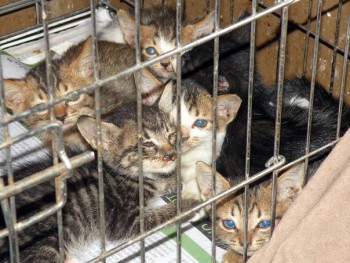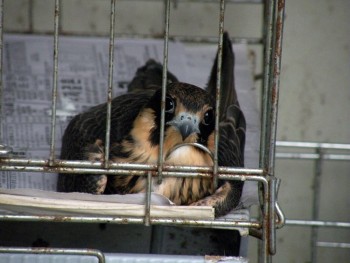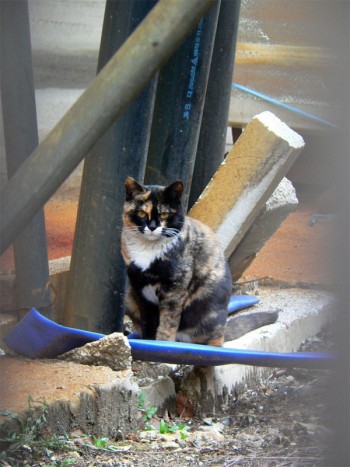This article gives an overview of options for helping street cats, stray dogs, or abused animals you've observed in your neighbourhood. It is a condensed version of an article originally written for the Korean Animal Protection Society by KAPS volunteer coordinator Emma Thompson, available in full on the KAPS Facebook page.
Please always carefully consider your situation, time and resources before picking up an animal. Shelters cannot always take them.
Helping Street Cats
Two important points the research makes about street cats:
- If you start feeding the cats, their number will increase due to the extra food (which also means cats will starve when you leave).
- If you take a cat off the street you are making space for another.
Catch-Neuter-Return (also called Trap-Neuter-Return or TNR)
Many cat rescue organizations suggest that the best course of action for street animals is to neuter them, this way their numbers remain constant and appropriate to the food supply. You also prevent the many cat fights that occur around mating time and as well as the deaths of thousands of kittens. Government-sponsored TNR programs exist in Korea. A foreign teacher has successfully carried out a ‘catch, neuter, return’ program for the last two years in Gyeongsan. There is also lots of information online about how to start a TNR program.
Once you know your local cats are neutered then you can feed them to your heart’s content. Where possible, try to explain to the neighbours and local restaurants your plan so that they know it is OK to feed these cats.
Found Kittens
 Keep an eye on kittens (from a distance if possible) for some time before picking them up. Often mother cats leave their kittens in a ‘safe’ place when they go to get food, she may be coming back. Kittens have a much higher survival rate when they are weaned by their own mother. If she doesn’t return it is possible she has been hit by a car or has simply abandoned them. In this case, KAPS absolutely advocates rescuing them.
Keep an eye on kittens (from a distance if possible) for some time before picking them up. Often mother cats leave their kittens in a ‘safe’ place when they go to get food, she may be coming back. Kittens have a much higher survival rate when they are weaned by their own mother. If she doesn’t return it is possible she has been hit by a car or has simply abandoned them. In this case, KAPS absolutely advocates rescuing them.
More information about helping street cats:
- Alley Cat Allies
- Street Cat Rescue: What is TNR?
- Urban Cat League: Feral FAQ
- Alley Cat Rescue FAQ
- Feral Cat Project: How You Can Help the Cats
- Caring for Neonatal Kittens
Helping a Dog Wandering Around Your Area
Lost or not?
 If you have no plan or are in a hurry, please do think sensibly. First of all, try to gauge from the state of his coat whether the dog you are seeing belongs to a local person or has been abandoned. Some people in Korea do just open their doors and let their dogs run around the neighbourhood for exercise! Small dogs can be on the street for some time before being caught. They tend to have matted or very dirty coats once we catch up with them.
If you have no plan or are in a hurry, please do think sensibly. First of all, try to gauge from the state of his coat whether the dog you are seeing belongs to a local person or has been abandoned. Some people in Korea do just open their doors and let their dogs run around the neighbourhood for exercise! Small dogs can be on the street for some time before being caught. They tend to have matted or very dirty coats once we catch up with them.
Finding the Owner
Is he wearing a collar? If he is and there is a number please call it before contacting a shelter. If not, but you have space at home, take him in and then make posters and post them in your local area to see if his owners come forward. See the "Helping a Stray" page on ARK for more suggestions on how to find a lost pet's owner.
Animal Control and Local Shelters
 If the dog is not friendly or you think he is a danger to people, call a local shelter. If you can contain him it would be helpful so the rescue man can come and get him. The shelter will really need to know where the dog is, running all around a neighbourhood looking for a dog is not a good use of a busy rescue driver’s time. However, before you do this make sure you too have time, as it may take a while before the rescue man gets to you. Please do be careful though. If you can catch and bring the dog to an animal shelter yourself that is another option (see #4 below).
If the dog is not friendly or you think he is a danger to people, call a local shelter. If you can contain him it would be helpful so the rescue man can come and get him. The shelter will really need to know where the dog is, running all around a neighbourhood looking for a dog is not a good use of a busy rescue driver’s time. However, before you do this make sure you too have time, as it may take a while before the rescue man gets to you. Please do be careful though. If you can catch and bring the dog to an animal shelter yourself that is another option (see #4 below).
Taking Home a Stray
If you have already rescued a dog or cat found in your area, you have several choices:
- Adopt. If you are willing and able, keeping the animal is one option. First you must make sure nobody is looking for him. If you have no response after a couple of weeks, then he is yours.
PLEASE do not ‘adopt’ animals while you live in Korea and then rehome them when you leave. This is very stressful for animals to cope with and after multiple rehomings the animal tends to have severe socialisation issues. Adoption means you plan keep the animal for the rest of his life. If you are not willing and able to do that then please find him a forever home as soon as possible. - Foster. This means you temporarily take care of the animal until you can find him a new and permanent home. First find out if his owners are looking for him. If this is unsuccessful, then you can make a profile for him on ARK. Take some cute pictures, regularly post updates, photos and videos and be sure to ask potential adopters to fill in an application form so you know they are prepared to take on the responsibility of a dog for the rest of his life. Why not post him on your Facebook feed and in local groups and pages, too?
- Put him back where you found him. For dogs in Korea the street is not a safe place, so options 2 or 4 would be best, but if you have ‘rescued’ a wild cat chances are he is going to be much happier back on the street than in your house! If you have rescued kittens, consider putting them in a box where you found them and keeping a close eye on them so their mother will hear their cries and come. This way you can choose to rescue her too (if possible) or she will take them somewhere safe and you can keep putting food out for her.
NOTE: If you have rescued a feral cat, please DO NOT put him back in a different place or after a period of several months. Cats have territories and he may have to fight to get his place. In this case, consider getting the cat neutered and vaccinated and bringing him to an animal shelter with all his paperwork. - Bring him to an animal shelter. Animal shelters have limited resources and simply cannot take on every animal. However, in some cases they are the best option. For example, if you are not allowed to keep animals in your building, if the animal is aggressive or scared of people, if you have tried unsuccessfully to find a home, or if the animal is in danger on the streets.
There are contact details for animal shelters in Korea on ARK, however, often shelters have no English-speaking workers, so please ask a Korean to help. The Animal Protection Management System maintains a full list of municipal shelters throughout Korea, but the site is in Korean only. When you go to the shelter, please be sure to explain that you rescued the animal. The chances of the animal you rescued finding a forever home are higher if you make an ARK adoption profile and keep the profile updated, even if he is living in the shelter.
Some animal shelters accept dogs, cats, birds and other wild animals, also small animals such as rabbits. If you are going to bring an animal to an animal shelter, KAPS suggests getting him neutered and vaccinated (where possible) before doing so and to bring the vet paperwork if you do! This will increase his chances of survival greatly and with this already done more people will be interested in adoption, knowing he is healthy. Also bring a food supply for the animal (especially if it is an unusual or exotic species like a hedgehog or iguana).

When You’ve Observed Animal Cruelty
In Korea animal cruelty laws are not as clear or as strict as in the West. However, several Korean organisations have managed to push through some successful animal cruelty cases in recent years, although the sentences are still depressingly light. This is a continually changing situation in Korea.
If you are able (and it won’t put you in danger) collect video or photos of the cruelty taking place. The organization you choose to help you will need to know the exact location, and where possible the names of those involved. You can then email these to the organisation, who will decide whether it is a case they can act on-- often there is no law or history of action to back them up. You can also report abusers to the police, but you would need some proof that there was a problem: a video or photo evidence that something bad happened.
Please note there often aren’t any English-speaking workers at Korean organizations, so if you can have a Korean help you write the message it would be helpful.
Organizations where you can report animal cruelty:
- CARE: - www.careanimalrights.org
- KARA: - http://animalrightskorea.org/animal-welfare/report-animal-abuse.html
Thanks to all those who worked on the notes, links, and photos for this page.
Written by Emma Thompson, KAPS Volunteer Co-ordinator.



